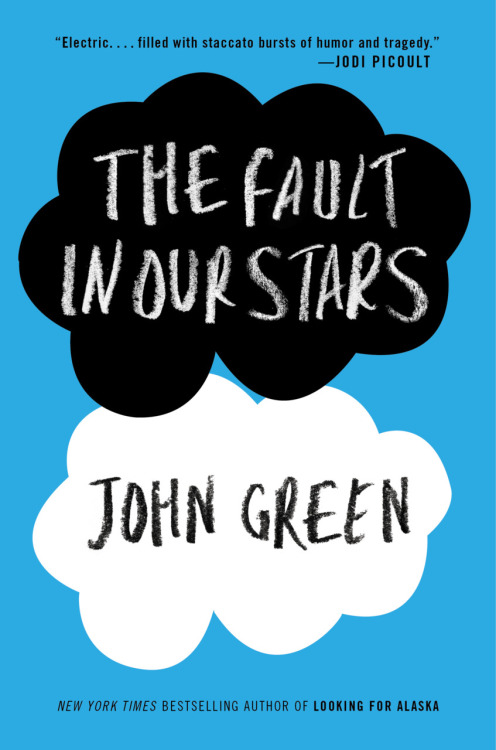 In which I express my disappointment with the beloved John Green's latest novel and receive worldwide scorn (or would, if anyone read this blog).
In which I express my disappointment with the beloved John Green's latest novel and receive worldwide scorn (or would, if anyone read this blog).I owe Jon for this post since I originally wrote it as a comment on his blog. Some minor editing has been performed.
First, let me say this: I love John Green's writing. I like that it's funny and smart and doesn't treat teenagers like they're all horny morons who do nothing but play video games or pine over Hollywood actors. He has what I believe is a perfect grasp on male friendships. I could go on, but all of the above has been said before and you're reading this for the criticism, not the praise. I know what you want.
As for The Fault in Our Stars, I thought Green's intelligence (and ego) got in the way of the story. This manifests itself most egregiously in his main characters' dialogue, which I found completely unbelievable. Even if you accept that Gus and Hazel possess expansive vocabularies (and I don't accept that in the case of Gus, who is a stud basketball player, plays a lot of video games, and reads the literary equivalent of fast food), I don't know any teenagers whose every conversation drips with metaphor, irony, and witty rejoinders.
Secondly, as he does in all of his books, but especially in this one, Green sacrifices story on the altars of theme, metaphor, and symbolism. It's almost as if he's writing in the hopes of impressing high school English teachers enough to use his book in place of the dusty classics. This one was so full of metaphor that it became impossible for me to read about the smallest detail without wondering what hidden meaning I was missing. I felt like I was in eleventh grade again, with Mrs. Rief prodding me to notice the symbolism on every page. A piece of playground equipment isn't just a piece of playground equipment. Kissing at the Anne Frank Museum isn't just two horny kids kissing. Stuff falling out of trees into a Holland river is probably more than just nice imagery. And even if it isn't, there is so much metaphor and symbolism and theme that you think it must be. It pulled me out of the story (what little story there was) time and again.
As a result, I didn't feel the emotion I know Green intended me to feel. It's hard to fall for the characters when Green insists on asserting himself with such attention-seeking regularity. Whenever I began to get sucked into the story, there was Green, pants off and waving them in the air, to remind me that he--HE--had written this. And wasn't it so damn full of MEANING?
Also, I found the references to the "genius" of Peter Van Houten off-putting, since he was invented by Green. Nothing says massive ego like having your characters gush about the genius of the words of another character you created. Disagree? Try this on for size:
"There are two kinds of people in this world," Lester said. "The kind that stop for a raccoon crossing the road and the kind that swerve to hit it."
Billy was speechless. He had never heard such truth spoken so eloquently.
Gagging yet? Unless I'm mistaken, Hermione and Harry didn't sit around talking about how wise professor Dumbledore was. Rowling let the reader make that conclusion. Possibly because she didn't feel the need to remind her readers how flipping smart she was every fifth page.
SPOILER ALERT:
And speaking of Van Houten, his reappearance at the funeral was something out of a bad movie and an editor never would have let a rookie author get away with it.
END OF SPOILER.
On the other hand, there are things to recommend the novel. Much of the writing, while self-aware and overdone, is gorgeous. And Green excels where it counts most: in telling the truth. I've never had cancer, but the way his characters handle it-their thoughts, reactions, fears, hopes, etc.--felt authentic to me. And it's balls-to-the-wall ambitious to tackle the topic of teenagers with cancer in the first place. One might argue that it takes a certain amount of ego to even think you can pull it off, and one would be right. Nevertheless, I admire authors who are ambitious, even if they fail. Perhaps because they fail. And for kids who have or have had cancer, the book is probably a comfort and might even be profound. If that's the case, and from what I've seen online it is, then despite its many faults, I'm glad John Green wrote it. My opinion isn't worth much when compared to a fifteen-year-old kid going through chemotherapy.
5 comments:
...be careful, Murph, you'd be surprised to know how many of us read your blog ;)
Not sure if I'll add this one to my reading list, but am glad I read your thoughts on it. Guilty as charged on the overuse of symbolism. It's a sinister elf whispering lousy advice into my ear while...oh wait, I'm doing it again.
You get the idea,
El
Very honest review. But I still want to read the book to see what the hype is all about. :)
Would you believe I've never read John Green? Doesn't sound like there are enough robots or explosions for my tastes.
Would you believe there are no robots at all? But if there were robots, I am quite sure they would leak metaphorically resonant oil.
I've read it. I liked it. Didn't love it, but liked it. I've never felt Green's characters, other than the ones in Looking for Alaska, to feel authentically teen-aged. For the same reasons you've stated here, I loathed the movie Juno.
Post a Comment